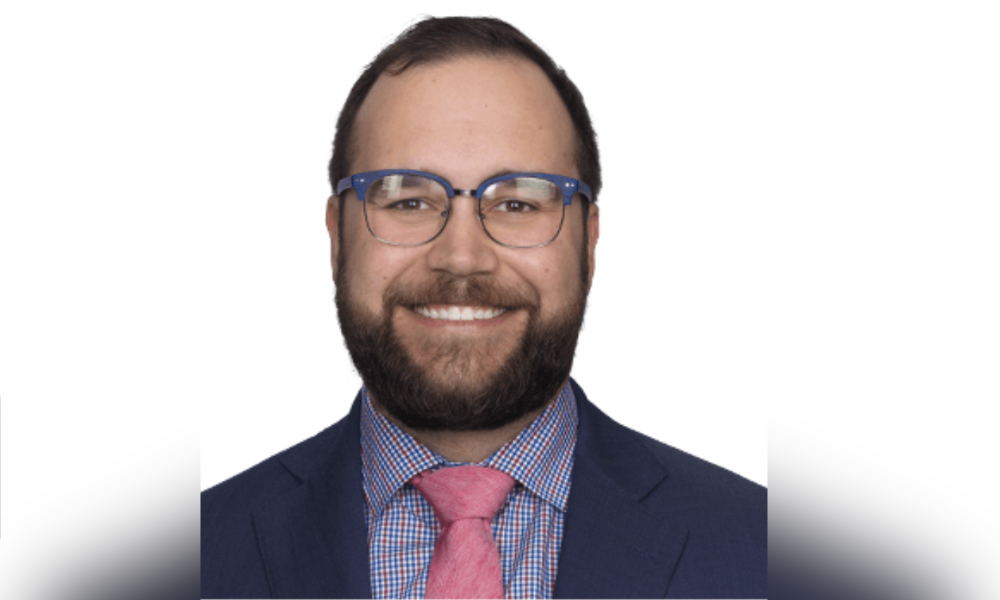Jeffrey Westman’s transition from private practice to litigation counsel at the Edmonton Police Service (EPS) wasn’t about escaping billable hours or chasing a promotion. It was about returning to a place where his values – courage, integrity, and a deep sense of family – weren’t just slogans. They were embodied in the work, in the people, and in the purpose.
“For me… values are actually informing everything you do,” Westman says. “When you are doing things that are inconsistent with those values or aren't somehow intrinsically rewarding, it just becomes more difficult to do.”
Westman’s journey back to EPS – where he once served as an officer – was personal as much as it was professional. After a stint at Bennett Jones in Calgary, he posted on LinkedIn that he was “thrilled to be moving back to Edmonton with my husband and rejoining the Edmonton Police Service as litigation counsel.” The decision wasn’t made lightly. “For many reasons too personal to share,” he wrote, “I’ve realized that my heart is still in policing.”
In his role at EPS, Westman focuses on litigation that carries reputational risk, especially those where public perception is shaped by short clips and soundbites. “The goal… is to tell a story,” he says. “For people to have confidence in the police… they have to understand what police are doing.” And it’s his job to help ensure that understanding comes with context and nuance.
Roughly 75 percent of his work involves preparing for or appearing in court and tribunals. His cases span the civil and administrative spectrum – no criminal matters, he clarifies. “Human Rights Commission, Law Enforcement Review Board, Edmonton Police Commission, civil court for lawsuits… mainly motions and questioning,” he explains. Occasionally, Westman encounters an officer who is distrustful of the media or legal process. A critical advantage of working in-house, he says, is the relationship he’s able to build with these officers. “You're able to approach them more as a colleague… and help them tell their own story.”
One such story involved a controversial use-of-force incident caught on video. In one angle, a police officer appeared to violently push a houseless woman to the ground before arresting her. “The video was super controversial… a serious crisis at the time,” Westman says. But another angle told a different story. “She had a knife, and was walking away from one confrontation with another woman and moving towards another.” The officer’s takedown, aggressive as it appeared to those who took to social media to condemn the officer, may have saved her life. “Nobody likes seeing use of force… but we got this kind of ‘aha’ moment from the public,” he says.
Westman’s belief in the importance of equity, diversity and inclusion in policing is just as pronounced. “EDI has special meaning for a police organization,” he says, stressing that its scope must encompass internal culture and external community relations. “We’re trying to… get through to people who… don’t have the same kinds of relationships with their police.We’re not perfect… but we are making progress with our own community.”
That same theme of balance – between accountability and protection, innovation and principle – recurs when Westman talks about public scrutiny. “If we… don’t fill an information gap, the gap is going to be filled somehow else,” he says. Whether through official channels or social media watchdogs, the public will hold police accountable. “We’re still trying to turn the ship on ,” he says. “Turning the ship while you're balancing all these other considerations… privacy of victims, privacy of officers, due process… all these aspects function in an ecosystem.”
The in-house environment presents its own set of challenges and rewards. “You're expected to be a generalist,” he explains. “But… you have access to a bench of external counsel… and [you] have to understand what your capacity is and the capacity of your team.” With just one other civil litigator and a team of paralegals, resource management becomes a key part of the job.
Westman’s collaboration with external counsel also reflects that balance between efficiency and connection. He recalls a positive experience reviewing an appeal brief with a trusted colleague – “We’re billed for the time, but… hopefully [get] a better product.” But he’s candid about the frustrations, too. “All any in-house lawyer wants is for their external counsel to care about their industry,” he says. Having worked with police files from inside and outside the service, he has a unique perspective on what EPS needs to gain the most from its relationships with law firms.
What makes a good external partner? Curiosity and engagement. “After a file goes well… they’ll say, ‘I’d love to go on a ride along.’ That’s one of the hints for me that they really appreciate the police work.”
Westman believes that no matter where you work, values matter – but understanding how they play out in practice is key. “If you have the maturity to do so, really try to figure out where management is… in terms of their values,” he says. “I’ve been so fortunate here… having leadership that just want to do the right thing for the right reasons.”





